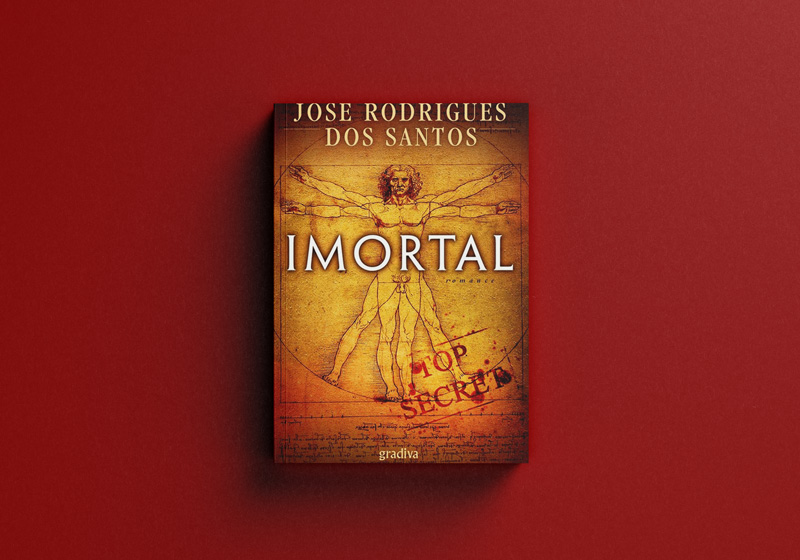Interview The Immortal for Diário de Notícias
- This book, Immortal, reminds us of the science-fiction from the 1960s. Is that why you warn your readers from the outset that “all scientific information in this novel is genuine”?
JRS: This is not a science fiction book, but a novel about the reality of today. Immortality is indeed within our grasp. Science is on the verge of defeating death and many scientists believe the first human being that will never die is already born. Professor Arlindo Oliveira, one of the great experts in Portugal on this field and the scientific reviewer of the book, told me that, with the exception of mind uploading, everything in this novel already exists or is about to exist. The amazing thing is that most people are not even aware of that. That is why I felt the need to tell readers that “all scientific information in this novel is genuine”. Because it is. I believe that each person would like to know that he or she can live much longer than it was originally thought possible and that this is about to become reality. I know this will help each one of us.
2.The final note surprises us due to its length. Without it, readers would not believe what they read?
JRS: My novels always include detailed final notes that help readers understand the non-fictional subject of the book. Since we are talking about a fictional work, it seems useful and interesting to tell readers what is true in the novel they just read. And, in the case of Immortal, almost everything is true. Considering the importance of the subject, the possibility of prolonging life to a point where we may never die, I believe that a non-fictional explanation is called for.
- Did you need to research more for this novel than usual?
JRS: All my novels are thoroughly researched, as anyone who usually reads me knows, and this one is no exception.
- George Orwell would never imagine that the danger would come from China…
JRS: No one would, I guess. When I lived in Macau, back in 1979, China was a very poor, underdeveloped country. Today it is a superpower that plans to materialize the Nazi dream of creating supermen. Furthermore, it has the means to do it. It also has 300 million cameras spread throughout the country to watch its population. China became the meeting point of Orwell’s and Huxley’s dystopias.
- Do you believe that China is ahead in the race to create a general artificial intelligence or did you merely adjust this country to the fictional plot you had in mind?
JRS: China is not yet ahead of the United States in artificial intelligence, but it will be soon. Did you know that in China many restaurants do not accept payment in cash anymore? Payment is carried out nowadays through facial recognition. What Immortal says about what is happening in China, which Westerners are not aware of, does not derive from the requirements of the plot but rather from the need to explain the reality of what is going on in that country. Oblivious to the ethic boundaries prevailing in the West, the Chinese are undertaking bold scientific experiments that will forever change humankind. They have already genetically manipulated human embryos to enhance them and they are inserting human brain cells in chimps’ embryos, experiments presumably focused on creating super-intelligent supermen. This is not fiction, this is happening and it is being reported by respectable scientific papers.
- Nowadays, you are setting aside traditional historical plots, books such as The Captain’s Daughter or Life in a Breath that you used to write, focussing instead on scientific advances and its dangers. Is there no coming back from this path?
JRS: I am not on such a path. My last fictional work, The Governor’s Lover, is a historical novel set in the Second World War in Macau. The other day a 90-year-old reader wrote me to say that she lived in Macau in those days, when she was a child, and she still remembers watching colonel Sawa and his Chinese concubine, both central characters in my novel, crossing the Porta do Cerco and entering Macau. Historical novels, always based on true events, are well established in my work and will remain so.
- Considering what you wrote in Immortal, are you still connected to the Internet or have you become more careful?
JRS: Just like a hand cannot stop the wind, whatever I do will not stop what is happening on the Internet. My novel presents a possibility that, whilst disturbing, is taken very seriously indeed by scientists: what if Internet suddenly awakens and becomes self aware? This may seem absurd, but many scientists who research this field are seriously considering such a possibility. Stephen Hawking’s last message was a warning about artificial intelligence, and Bill Gates cautioned that we are on the verge of losing control of the machines. Elon Musk is also very concerned about this problem. Many well-known personalities in this field consider artificial intelligence potentially more dangerous than nuclear weapons. As a novelist, my duty is to explain this situation to readers.
- You say something I find disturbing in your book: “this is going to take place in our lifetime”. Do you believe so?
JRS: This is not a matter of believing, it is a matter of reading the signs of our times. In the past, fundamental changes would take place from millennia to millennia. Separating the invention of agriculture, the invention of the wheel and the invention of writing are thousands of years. But then everything started to accelerate. In the 20th century, big changes were already taking place from generation to generation. Now we have unbelievable changes within a single generation. When I began reporting the news, long-distance phone calls were difficult. We also had telex machines and mechanical typewriters. Then electrical typewriters showed up, followed immediately by personal computers, then by the Internet and later emails. One day I heard a telephone ring inside the London tube – it was the first portable I ever saw. Then portables became small and within a few years you could send pictures. In no time they became real computers. There are already underway experiments to implant chips in the brain that, using a Bluetooth system, will enable us to link to computers by thought and hence communicate with other people also by thought, via WhatsApp. Have you noticed how quickly changes occur nowadays? The pace of change is now incredibly fast and in the next five years the world will change as much as it changed in the last ten – bearing in mind that in the last ten it has already changed a great deal. We get the impression that Facebook is something that has been around for quite a while, but the fact is it was only created in 2004. Dramatic changes about what it means to be a human being will certainly “take place in our lifetime”.
- You predict that human beings will almost treble their life expectancy. Do you also believe this?
JRS: It is already happening. Life expectancy for the Cro Magnon man, for example, was eighteen years. At the beginning of the 20th century it was fifty years in the United States. How much is it now? Eighty? Ninety? With all these changes going on, how much it will be in ten or twenty years?
- You predict the end of humankind as we know it happens after artificial intelligence enters our bodies and our lives. Isn’t this going a bit too far?
JRS: If you have not figured out what is happening to humankind, you have not read the sign of the times.
- You quote Vernor Vinge in your book when he said that we cannot stop the moment when artificial intelligence generates a singularity. Do you think this is something that could feed another novel of yours or is this subject conclusively dealt with by Immortal?
JRS: I have not planned a sequel, but who knows? The subject is rich with implications and novelists have the duty to help unveil the world we live in. Future is a shadow and literature a light that breaks it.
- Of all things you spoke about in your novel, what do you doubt will happen?
JRS: You want me to be honest? I think everything is going to happen. For the reasons explained in the novel.
- We do not usually see Lisbon being so violently attacked as it happens in other corners of the world. Was this display of fireworks necessary for the book?
JRS: Immortal is a novel about something real. The information within the book is actual information, but this remains a work of fiction. If José Saramago was allowed to spread havoc in Lisbon with an epidemic of blindness, why can’t I do the same with an epidemic of artificial intelligence? Or is anyone accusing Saramago of displaying fireworks?
- How do you view the Lisbon Underground refusal of providing information to you about its security protocols?
JRS: I understand them. Above all, I realized I had touched a very sensitive subject.
- Did you write this book having a movie in mind?
JRS: Not at all. I am a novelist, not a filmmaker. I am only a filmmaker insofar as, using words as tools, I thrive for readers to view the books as movies in their minds. My writing generates pictures and it’s them that fill the minds of my readers when they read me.
- Where did you get the idea for Immortal?
JRS: Maybe from The Einstein Enigma. In a certain way, Immortal is a sequel to The Einstein Enigma, in the sense that it shows how some of the predictions of The Einstein Enigma will take place.



